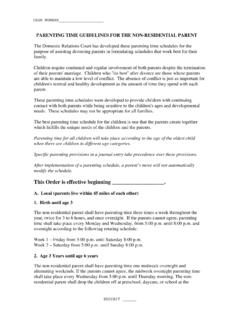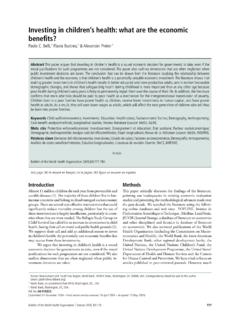Transcription of Influencing: The key to successful business relationships
1 Brent is a Client and Programme Director at Ashridge. He specialises in leadership, team-building, infl uencing, coaching, cross cultural management, leading change and personal development. His interests include how to foster self-awareness and creativity, and how to challenge effectively. With extensive experience as a trainer, facilitator and coach, his interventions include designing and running workshops for many organisations in Europe, Asia Pacifi c and the : key to successful business relationshipsIn business , a high proportion of your working day is spent relating to other people as a leader you need to focus as much on communicating, creating and developing effective working relationships , as you do on the functional aspects of your Dent and Mike Brent describe a range of tools and techniques to make you more effective in this crucial skill of Dent is a Director of Executive Education at Ashridge.
2 She specialises in interpersonal and infl uencing skills, leadership, team working, and people management skills. Her current interests are in the areas of relationship management, infl uencing, self-managed development and women leaders. She has written extensively on the subject of Infl uencing in the business : fi relationships are the bedrock of human existence as humans we are the most social species after ants, termites and bees! We are social and political animals with an independent and an interdependent sense of identity. We are our relationships and the quality of our lives is a function of our relationships . As a leader and manager you need to focus as much on infl uencing, communicating, creating and developing effective working relationships , as you do on the technical or functional aspect of your job.
3 So, whatever you do, whatever your level, and in whatever organisation, relationships matter for your effectiveness, reputation and success. You simply cannot be an effective leader or manager if you cannot effectively relate to and infl uence important part of any working relationship is how you go about getting commitment and buy in from others to do the things that need to be done. There has been a general The Ashridge Journal Infl uencing: The key to successful business relationships Spring 2011 Ashridge business School from leadership by command and control to leadership through commitment and engagement. So, in this new way of working:How do you secure agreement from others? How do you get buy in to a project? How do you persuade and convince others?
4 Engaging with others, gaining commitment and infl uencing starts with the quality of the relationship which will undoubtedly affect your success as a leader or on our experience of working with thousands of business leaders and managers, we have developed a range of models, tools and techniques which are designed to help you become more effective in this crucial business skill. These are summarised in this article, and discussed in detail in our recently published book The Leader s Guide To Influence: How to use soft skills to get hard relationship model Effective leaders understand that it is important to refl ect on the quality of all your relationships , and to use the information effectively. We have created the following model to help you do this (Fig 1).
5 The model enables you to assess each relationship based on its value to you for work reasons and for sociability reasons. Thinking about relationships in this context will help you to:Understand more about each relationship why some are easy, diffi cult, challenging, frustrating, etcRefl ect about your motivations for each relationshipAssess the value of each relationship to you personally and for business related features of each category are as follows:Casual relationship where there is a low work need and a low sociability need; a relationship that is not essential to core activities and is therefore a relationship that is peripheral and superfi relationship that is:non essential with a person you have little contact withwith a person you know very little aboutwith a person for whom you have neutral feelingswith someone you are aware of but don t have much contact withsuperfi cial.
6 For exampleEvery morning and evening when you arrive and leave the office you chat and say good morning and pass the time of day with the security staff, perhaps chatting about their recent holiday or what they did at the weekend or previous evening. So, you are friendly to these people but they are low on both your work and sociability need scales a casual 1. Work based relationships modelWORK NEEDSOCIABILITY NEED Dent and Brent 2010 High 10 Low 1 High 10 TRANSACTIONAL RELATIONSHIPCASUAL RELATIONSHIPMUTUALLY DEPENDENT RELATIONSHIPSOCIAL RELATIONSHIPThe Ashridge Journal Infl uencing: The key to successful business relationships Spring 2011 Ashridge business School relationship where there is a low work need and a high sociability need; where the main motivation for the relationship is an emotional connection which leads to friendliness.
7 A relationship that is:non essential a person you choose to socialise with at work, perhaps having lunch with thema person you share ideas with and trust and respecta person who knows about you and you know about them at a more personal levela person you choose to spend time exampleMost of us have at least one person at work that we confide in often this person isn t in our work group nor are they crucial to work but rather someone with whom you have built a trusting relationship , whose opinions matter to you and whose company you enjoy a social relationship where there is high work need and low sociability need; those professional relationships necessary to get a job done. A relationship that is:essential for work with a person you would not naturally choose to spend time with other than for work reasonswith someone you know little about but need to get the job donewith someone you don t really feel strongly aboutwith a person you know will be able to help you in your current role or exampleThis is the person you know is crucial for getting your work done and someone you find difficult to relate to, so there is no other reason for the relationship to exist other than for job related reasons a transactional dependent relationship where there is high work need and high sociability need; where there is a balance of need from both a work and a social perspective.
8 A relationship that is:based on mutual support and friendshipwith a person you know well and respectwith someone you enjoy being with and is central to you getting the job donewith someone who you enjoy sharing ideas, knowledge and experience with. For exampleThe person you know you want to have in your project team you enjoy their company and you know they do a great job; possibly even more than this you make a good team a mutually dependent uential and relationally intelligent leaders recognise that they will have work based relationships in all four categories; the important thing is to recognise which category each person falls into, and if it is appropriate for that particular person. If not then you may have to invest some time and energy into developing the relationship further to ensure you are getting the best from addition to understanding the quality and basis of your relationships , a key factor for understanding and developing infl uential relationships is having an appreciation of your relationship style.
9 Most of you have a preferred way of working with others. This is based on your habitual behaviour and comes about because you have found that certain approaches, behaviours, and skills seem to work for you when interacting with Ashridge Journal Infl uencing: The key to successful business relationships Spring 2011 Ashridge business School one style is best or worst, each style is simply different and each has its own positive and negative aspects. Your preferred style will have an effect upon the way you relate to others, how you are perceived by others and how others relate to you. Our approach is based on a two dimensional model, where each of your preferences plays a role in the way you relate to people. (Fig 2). The preferences are:Are you more outgoing or more reserved?
10 Are you more person focused or more job focused ?Your positioning on these preferences then translates into your relationship exampleJack is the Financial Director of a major international insurance company. He attended one of our recent programmes where we discussed the relationship style questionnaire. He found that his preferred relationship style is realist and he told us that he tended to use this style with all his colleagues and had wondered why this worked well with some people but not with others. He had a challenging relationship with one of his direct reports, Tony, who wanted to adopt a more sociable approach where he chatted about non-work issues. Jack saw this as irrelevant and time wasting and became more and more frustrated.





